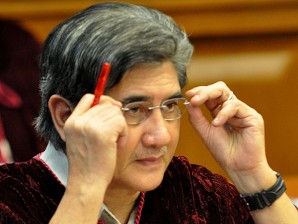MANILA, Philippines—As the Senate moves to remove libel as a crime from the country’s penal code, hearings on decriminalizing the offense would revive discussions on an almost forgotten measure that seeks to provide maligned individuals the right of reply in the media.
Sen. Gregorio “Gringo” Honasan, chair of the Senate committee on public information and mass media, said the panel’s hearings on at least four bills decriminalizing libel would also include discussions on the right of reply bill.
“What I will be applying in this case is a constitutional principle we refer to as balancing of interests,” Honasan told the Inquirer.
Honasan said that while journalists would have to contend with issues such as prior restraint and the chilling effect of being confronted by government regulation, the subjects of their criticism have their own rights to protect such as those on their life and on “presumption of honor.”
“It takes a lifetime to build a decent, a clean family name. Now comes [unscrupulous media] who make undue allegations against you and then you’re finished,” Honasan said.
Filed after Aquino signed bill
Honasan’s committee is expected to tackle the bills decriminalizing libel when Congress resumes sessions on Nov. 5.
The pending bills on the matter were filed by Senators Francis Escudero, Alan Peter Cayetano, Pia Cayetano and Loren Legarda.
Except for Escudero’s bill that was filed on July 27, 2010, all the measures were filed after President Aquino signed the Cybercrime Prevention Act which considers online libel a crime punishable by six to twelve years of imprisonment.
Libel under the Revised Penal Code is only punishable by six months to six years of imprisonment.
The cybercrime law, Republic Act No. 10175, was heavily criticized only after the President signed it into law.
The filing of bills to decriminalize libel followed.
Escudero, for his part, filed a bill to repeal the online libel provision in the cybercrime law.
He admitted that the provision slipped by him during the crafting of the law.
RA 10175 is now the subject of a 120-day temporary restraining order issued by the Supreme Court after more than 10 groups of petitioners questioned its constitutionality.
“It can go both ways [for media and the subjects of their criticism] if you explain. That’s what I’m saying.
This is not a cut and dried issue. I’ll start with the first hearing on decriminalizing libel for everybody, not only journalists, and then the right to reply,” Honasan said.
“And then from there, if warranted, we will branch out. But I’d like to get initial inputs,” he added, indicating the possibility of separate hearings for the right of reply measure.
Pushed in the last Congress by then Sen. Aquilino Pimentel, Jr., a right of reply bill is pending in the Senate as authored by Sen. Manuel Villar.
“We’ll have meetings on the decriminalization of libel…. We might also tackle the right to reply. It can’t be that when you are criticized, you can’t do anything but keep quiet,” Honasan told reporters in a news forum last week.
“There has to be a way for you to be able to answer [allegations] point by point,” he added.
